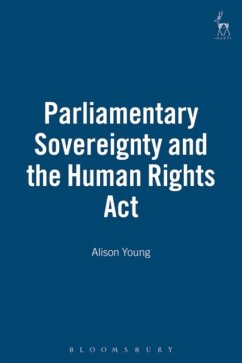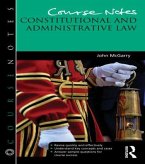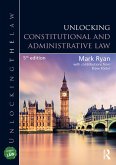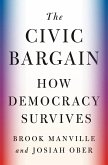Alison L Young (UK University of Cambridge)
Parliamentary Sovereignty and the Human Rights Act
Schade – dieser Artikel ist leider ausverkauft. Sobald wir wissen, ob und wann der Artikel wieder verfügbar ist, informieren wir Sie an dieser Stelle.
Alison L Young (UK University of Cambridge)
Parliamentary Sovereignty and the Human Rights Act
- Gebundenes Buch
- Merkliste
- Auf die Merkliste
- Bewerten Bewerten
- Teilen
- Produkt teilen
- Produkterinnerung
- Produkterinnerung
This book argues that the principle of parliamentary legislative supremacy is sufficiently flexible to enable a stronger protection of human rights.
Andere Kunden interessierten sich auch für
![Course Notes: Constitutional and Administrative Law Course Notes: Constitutional and Administrative Law]() John McGarryCourse Notes: Constitutional and Administrative Law50,99 €
John McGarryCourse Notes: Constitutional and Administrative Law50,99 €![Unlocking Constitutional and Administrative Law Unlocking Constitutional and Administrative Law]() Mark Ryan (UK University of Coventry)Unlocking Constitutional and Administrative Law109,99 €
Mark Ryan (UK University of Coventry)Unlocking Constitutional and Administrative Law109,99 €![The Civic Bargain The Civic Bargain]() Brook ManvilleThe Civic Bargain26,99 €
Brook ManvilleThe Civic Bargain26,99 €![Parliamentary Sovereignty Parliamentary Sovereignty]() Jeffrey Goldsworthy (Professor, Monash University, Victoria)Parliamentary Sovereignty60,99 €
Jeffrey Goldsworthy (Professor, Monash University, Victoria)Parliamentary Sovereignty60,99 €![Public Law Public Law]() Michael DohertyPublic Law106,99 €
Michael DohertyPublic Law106,99 €![Public Finance and Parliamentary Constitutionalism Public Finance and Parliamentary Constitutionalism]() Will Bateman (Canberra Australian National University)Public Finance and Parliamentary Constitutionalism38,99 €
Will Bateman (Canberra Australian National University)Public Finance and Parliamentary Constitutionalism38,99 €![The Great Parliamentary Bore (1869) The Great Parliamentary Bore (1869)]() Evans BellThe Great Parliamentary Bore (1869)35,99 €
Evans BellThe Great Parliamentary Bore (1869)35,99 €-
-
-
This book argues that the principle of parliamentary legislative supremacy is sufficiently flexible to enable a stronger protection of human rights.
Produktdetails
- Produktdetails
- Verlag: Bloomsbury Publishing PLC
- Seitenzahl: 198
- Erscheinungstermin: 5. Dezember 2008
- Englisch
- Abmessung: 240mm x 161mm x 15mm
- Gewicht: 454g
- ISBN-13: 9781841138305
- ISBN-10: 1841138304
- Artikelnr.: 24998347
- Herstellerkennzeichnung
- Produktsicherheitsverantwortliche/r
- Europaallee 1
- 36244 Bad Hersfeld
- gpsr@libri.de
- Verlag: Bloomsbury Publishing PLC
- Seitenzahl: 198
- Erscheinungstermin: 5. Dezember 2008
- Englisch
- Abmessung: 240mm x 161mm x 15mm
- Gewicht: 454g
- ISBN-13: 9781841138305
- ISBN-10: 1841138304
- Artikelnr.: 24998347
- Herstellerkennzeichnung
- Produktsicherheitsverantwortliche/r
- Europaallee 1
- 36244 Bad Hersfeld
- gpsr@libri.de
Alison Young is a Fellow and Tutor in Law at Hertford College, Oxford.
1 INTRODUCTION I. Defining Parliamentary Sovereignty: Dicey's Conception
II. The Compatibility of the Human Rights Act 1998 with Dicey's Theory of
Parliamentary Sovereignty III. Sovereignty Explored IV. In Defence of the
Human Rights Act 1998 V. In Defence of Dicey 2 INTERPRETATION AND IMPLIED
REPEAL I. Continuing Parliamentary Legislative Supremacy and the Doctrine
of Implied Repeal: the Orthodox Account II. The Narrow Scope of Implied
Repeal III. How to give Human Rights an 'Entrenchment Effect' IV.
Conclusion 3 REDEFINITION AND THE RULE OF RECOGNITION I. Continuing and
Self-embracing Parliamentary Legislative Supremacy II. Manner and Form and
Redefinition III. Methods of Entrenchment IV. Conclusion 4 DEMOCRACY AND
RIGHTS I. Dicey and Democracy II. Constitutional Rights III. Democratic
Dialogue IV. Conclusion 5 DEMOCRATIC DIALOGUE AND THE HUMAN RIGHTS ACT 1998
I. Models of Dialogue II. Justification of Democratic Dialogue III.
Justifications of the Human Rights Act 1998 IV. Dialogue and Institutional
Competences V. Towards a Theory of Adjudication VI. Conclusion 6 A THEORY
OF ADJUDICATION I. The Current Legal Test II. A New Theory of Adjudication
III. Conclusion 7 CONCLUSION I. A Modest Defence of Continuing
Parliamentary Legislative Supremacy II. Conclusion
II. The Compatibility of the Human Rights Act 1998 with Dicey's Theory of
Parliamentary Sovereignty III. Sovereignty Explored IV. In Defence of the
Human Rights Act 1998 V. In Defence of Dicey 2 INTERPRETATION AND IMPLIED
REPEAL I. Continuing Parliamentary Legislative Supremacy and the Doctrine
of Implied Repeal: the Orthodox Account II. The Narrow Scope of Implied
Repeal III. How to give Human Rights an 'Entrenchment Effect' IV.
Conclusion 3 REDEFINITION AND THE RULE OF RECOGNITION I. Continuing and
Self-embracing Parliamentary Legislative Supremacy II. Manner and Form and
Redefinition III. Methods of Entrenchment IV. Conclusion 4 DEMOCRACY AND
RIGHTS I. Dicey and Democracy II. Constitutional Rights III. Democratic
Dialogue IV. Conclusion 5 DEMOCRATIC DIALOGUE AND THE HUMAN RIGHTS ACT 1998
I. Models of Dialogue II. Justification of Democratic Dialogue III.
Justifications of the Human Rights Act 1998 IV. Dialogue and Institutional
Competences V. Towards a Theory of Adjudication VI. Conclusion 6 A THEORY
OF ADJUDICATION I. The Current Legal Test II. A New Theory of Adjudication
III. Conclusion 7 CONCLUSION I. A Modest Defence of Continuing
Parliamentary Legislative Supremacy II. Conclusion
1 INTRODUCTION I. Defining Parliamentary Sovereignty: Dicey's Conception
II. The Compatibility of the Human Rights Act 1998 with Dicey's Theory of
Parliamentary Sovereignty III. Sovereignty Explored IV. In Defence of the
Human Rights Act 1998 V. In Defence of Dicey 2 INTERPRETATION AND IMPLIED
REPEAL I. Continuing Parliamentary Legislative Supremacy and the Doctrine
of Implied Repeal: the Orthodox Account II. The Narrow Scope of Implied
Repeal III. How to give Human Rights an 'Entrenchment Effect' IV.
Conclusion 3 REDEFINITION AND THE RULE OF RECOGNITION I. Continuing and
Self-embracing Parliamentary Legislative Supremacy II. Manner and Form and
Redefinition III. Methods of Entrenchment IV. Conclusion 4 DEMOCRACY AND
RIGHTS I. Dicey and Democracy II. Constitutional Rights III. Democratic
Dialogue IV. Conclusion 5 DEMOCRATIC DIALOGUE AND THE HUMAN RIGHTS ACT 1998
I. Models of Dialogue II. Justification of Democratic Dialogue III.
Justifications of the Human Rights Act 1998 IV. Dialogue and Institutional
Competences V. Towards a Theory of Adjudication VI. Conclusion 6 A THEORY
OF ADJUDICATION I. The Current Legal Test II. A New Theory of Adjudication
III. Conclusion 7 CONCLUSION I. A Modest Defence of Continuing
Parliamentary Legislative Supremacy II. Conclusion
II. The Compatibility of the Human Rights Act 1998 with Dicey's Theory of
Parliamentary Sovereignty III. Sovereignty Explored IV. In Defence of the
Human Rights Act 1998 V. In Defence of Dicey 2 INTERPRETATION AND IMPLIED
REPEAL I. Continuing Parliamentary Legislative Supremacy and the Doctrine
of Implied Repeal: the Orthodox Account II. The Narrow Scope of Implied
Repeal III. How to give Human Rights an 'Entrenchment Effect' IV.
Conclusion 3 REDEFINITION AND THE RULE OF RECOGNITION I. Continuing and
Self-embracing Parliamentary Legislative Supremacy II. Manner and Form and
Redefinition III. Methods of Entrenchment IV. Conclusion 4 DEMOCRACY AND
RIGHTS I. Dicey and Democracy II. Constitutional Rights III. Democratic
Dialogue IV. Conclusion 5 DEMOCRATIC DIALOGUE AND THE HUMAN RIGHTS ACT 1998
I. Models of Dialogue II. Justification of Democratic Dialogue III.
Justifications of the Human Rights Act 1998 IV. Dialogue and Institutional
Competences V. Towards a Theory of Adjudication VI. Conclusion 6 A THEORY
OF ADJUDICATION I. The Current Legal Test II. A New Theory of Adjudication
III. Conclusion 7 CONCLUSION I. A Modest Defence of Continuing
Parliamentary Legislative Supremacy II. Conclusion








